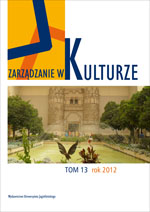Czy można organizować sztukę niezależną? Analiza rozwiązań stosowanych w pozainstytucjonalnym teatrze niemieckim
Is it possible to organize an independent art? Analysis of solutions used in the non -institutional German theatre
Author(s): Małgorzata ĆwikłaSubject(s): Cultural Essay, Political Essay, Societal Essay
Published by: Wydawnictwo Uniwersytetu Jagiellońskiego
Keywords: independent culture; non-institutional theatre; performing arts management; theatre festivals; Freie Szene; co-productions; audience research
Summary/Abstract: The article describes the practices of organizing artistic activities away from the traditional patterns of institutional landscape. The general regularities, typical of independent art, are illustrated on the example of a non-institutional theatre in Germany (so-called „Freie Szene”) and supplemented with a discussion of its features inscribed in the local context. Through the introduction of comparison with the situation of the independent art initiatives within the performing arts in Poland, the unique element characteristic of this type of theatre is underlined and pointed to its relationship with the culture management mechanism used in each country. At the same time, an important element in the analysis is the assumption according to which the focus was placed on the non-economic aspects, in order to take into account the wide range of factors that affect the ability to create theatre by independent groups. The observation of the achievements of German art groups leads to the belief that what is particularly important for the independent scene is an organizational model based on proven solutions used in repertory theatres and in creative associations exclusively oriented on project work. Combining independent initiatives with the publicly subsidized theatres and festivals leads to the establishment of new ways of creating, displaying and distributing stage works and additionally blurs the boundary between independent culture and the one associated with the institutions. Background of this reflection is a relationship shaped by cultural centers dedicated to supporting independent theatre with the audience – both in Poland and in Germany – and the issue of the impact of cultural policies on the possibilities of developing independent culture.
Journal: Zarządzanie w kulturze
- Issue Year: 13/2012
- Issue No: 3
- Page Range: 281-292
- Page Count: 12
- Language: Polish

